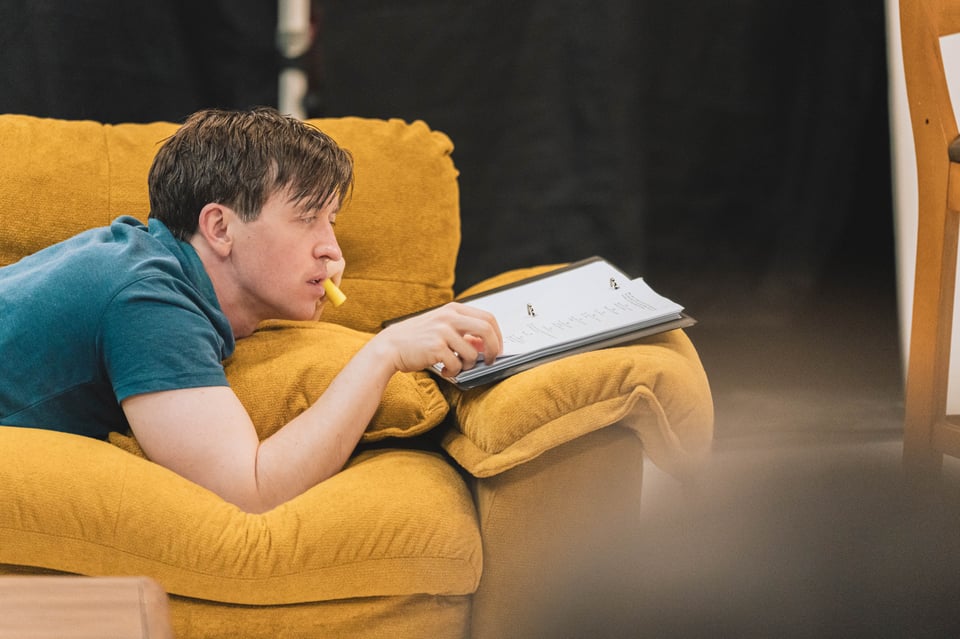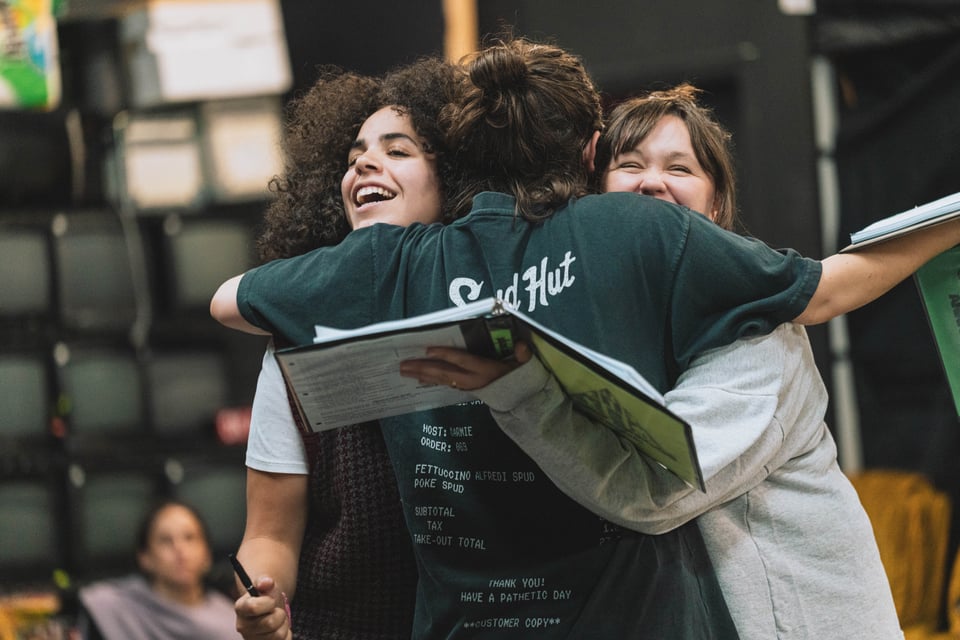Pat Tuesday: how to write dialogue
Hi y’all, Happy Pat Tuesday!
We are about three weeks out from the opening of BIG BEAR and it truly feels like it. Tech elements are beginning to become more real, the cast is close to off-book, and we’re thinking too hard about the tiniest things—exactly what we should be doing right now. We are thrilled to be doing this show and hope you can make it--tickets are available here and they certainly are going fast!
ALSO, the digital ticket for Saturday’s show is also available—go to this link to get it ASAP!

I got a great email from a subscriber the other day that read:
“I had a question for you in regards to writing - how do you ensure your dialogue feels natural? I’m a filmmaker (well, I’ve made student films) and I love writing, but I’ve always struggled with the dialogue. I’m autistic so I sometimes struggle to understand how other people think, and that has made it difficult for me to write believable interactions between characters. I know everyone has a different writing process, and your brain definitely works differently to mine, but I’d still love to hear your thoughts.”
Shout out to you for asking! What a fun question! Dialogue can be obviously one of the trickiest elements of writing. You can sniff out bad dialogue a mile away, and during this process for BIG BEAR, I’ve been sniffing it all over my own scripts. I’ll be sitting in rehearsal and circle huge chunks and just write “YUCK” or “AWFUL” next to it. I consider it a huge gift, because actors are essentially human lie detectors—they want their words to sound believable, and if your dialogue is off, some part of their psyche will literally reject it. That’s definitively when you know the dialogue is bad: when you have the perfect actor for your role and the words still sting to hear.

But before the massive luxury of actors, how do you make sure your dialogue is good and distinct and truthful and unique? To be honest this is hard to speak on, because I think it’s so innate. But there’s a few things that I think are helpful in applying here:
Top of your intellegence - this is an improv phrase about always playing as smart as you can possibly play. Ask the real questions—don’t play dumb. Dumb feels inauthentic. The way I mutate this for writing is figuring out where these characters are drawing their vocabulary from. In real life, your friends who watch TikTok all day might have a different well of references, slang, and buzzwords than your friends who spend all their time watching Martin Scorsese movies. Where were these characters immersed, and how are we seeing that come out? Whether they’re from Boston or Texas, if they spend all their time in break rooms or on track fields, they’re all centered in a world that might or might not be where we’re seeing them in your piece, so what has shaped them? So figure out what your character is or has been “intaking”, and see if that comes out when they’re in the situation you’ve built.
Your characters’ confrontation styles - this might just be because BIG BEAR is so full of moments where characters “air it out”, but a lot of dialogue for me is figuring out how characters try to avoid the actual problem at hand. And those skills are honed from years and years of figuring out ways to avoid conflict and say usually the thing that will keep them away from it. Whether they’re bringing something else up, or deflecting with a comment, or trying to crack a panicked joke, I think it’s important for writers to remember that diving into conflict is something that real people avoid at all costs, because it’s almost impossible to breeze over easily—even a tense conversation about someone being 5 minutes late can have YEARS of implications. So I like to play with ideas about characters’ past—have they ever been in leadership positions? What kind of ways would they have conflict with their parents? Do they watch reality TV? To know your character is to know what they’d do in distress, and then to work backward to see all the ways they’d try and stop the situation from getting to that point. And once you’re in that moment—are they good at fighting? Are they in control? Or are they clawing to be free from it again?

Lauren Lopez via Jill Petracek! What do you wanna say? Sometimes, if you have something you want to say in your play, but you’re not sure how someone else would say it, write down how you’d say it first and then slap some “character filters” on it, so it doesn’t feel like the voice of you (aka the voice of God) is possessing these characters who otherwise are just living their lives. Some people don’t care about this and their voice is their voice. Good for them! But you can also try and be slick so it doesn’t feel like you’re there too.
For example, if you want a character to say “I genuinely think people are inherently good”, start there and run it through another personality. If I wanted a 4 year-old to say it in a way that wouldn’t be obvious, I’d think of 4 year-old dialogue, 4 year-old reference points, and 4 year-old ways of thinking to come up with something like “Daddy, is everybody like mommy?” (bad but you get the point). But how would a 75 year-old grump say it? Or a truck driver, or a mermaid, or a Civil War general, or a bug? Again, if the feelings are true, then the sentiment will feel real.
Listen to people talk. Most importantly, get out there and just listen to people talk. August Wilson plays are incredible because it’s dialogue from general stores and barbershops that Wilson simply overheard, and took those real rhythms to the stage in a way that changed everything. If you want it to feel real, leave the ums, leave the rambling. That’s the pulse of the play—building that patter is what gives your work its music. Plot will find its way, that’s its job—but surrounding that stuff with honest moments that we can relate to will help plot be way more effective.

Kimia, Angela, and Emily via Jill Petracek Now go write some people! Dialogue is my favorite!
PAT’S CORNER - things I’m doing this week
BIG BEAR TICKETS AVAILABLE NOW - they’re going fast and would hate for you to miss it!
AOAOAOA’s Storytelling Episode - as a diehard This American Life lover, this was one of my favorite episodes we’ve done (I’m sorry in advance, David Sedaris)
[solidcore] ad campaign with Ego Nwodim - Got to help my sweet friend Ego Nwodim with these really fun solidcore ads which launched today—honestly can’t believe they let us put rims on a reformer, dream big everybody!
The BIG BEAR Table Read - donors to the Kickstarter are now able to watch the BIG BEAR Table Read! Listen to the cast read the play over on the Kickstarter!
PAT’S PICKS - something I’m digging
“Man I Need” by Olivia Dean - not to be annoying but I saw Olivia Dean at Coachella and was deeply obsessed with her. So excited this late-summer bop is blowing up! Go listen to it and walk proudly through a department store or something.
Thanks y’all! Talk soon!
Patrick